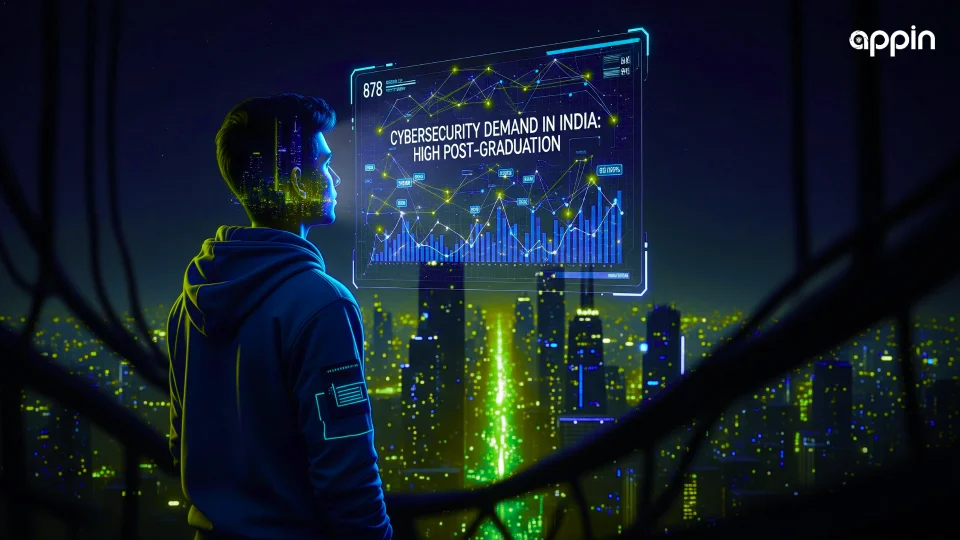Is Cybersecurity a Good Career After Graduation?
Yes, a cybersecurity career after graduation offers better prospects than traditional IT roles because it’s a specialized field with high demand and strong job security. Most fresh graduates rely only on their degree, which isn’t enough to secure good jobs. The skill gap between what companies need and what degrees provide is massive in the IT industry.
Cybersecurity is different because it focuses on solving real problems that organizations face daily: protecting data, preventing attacks, and securing networks. Companies are actively looking for professionals who understand these challenges and can apply practical solutions.
The good news is that fresh graduates can bridge this gap through focused training and certifications. Unlike general IT degrees, cybersecurity training gives you hands-on experience with real tools, actual hacking scenarios, and industry-standard practices.
In this guide, we’ll explore why cybersecurity is a smart career choice for you after graduation. We’ll cover job demand, salary expectations, required skills, and how to get started. By the end, you’ll understand exactly what it takes to launch a successful cybersecurity career from day one.
Is cybersecurity in high demand after graduation in India?
Yes, cybersecurity jobs are in extremely high demand right now, with thousands of positions available across India for fresh graduates and entry-level professionals. The job market for cybersecurity continues to grow faster than most IT fields because cyber threats are increasing daily.
Here’s what the market looks like:
- India’s cybersecurity job market is growing at 15-20% annually, much faster than general IT roles
- Companies across banking, healthcare, e-commerce, and government sectors are hiring aggressively
- Entry-level positions like Security Analyst, Junior Penetration Tester, and Security Operations Center (SOC) Analyst are readily available for fresh graduates
- Tier 2 and Tier 3 cities like Indore, Pune, and Ahmedabad have growing cybersecurity job opportunities
The reason is simple: cyber attacks are costing companies billions of rupees every year. Organizations realize they need dedicated cybersecurity professionals to protect their assets. This creates genuine job security for you.
Unlike general IT roles where competition is fierce, cybersecurity has fewer candidates compared to open positions. This means you have better chances of getting hired quickly after training.
Many companies specifically look for fresh graduates because they’re easier to train in their specific security practices. They prefer candidates with certifications and practical exposure over generic IT knowledge.
Certified ethical hacking training programs bridge this gap perfectly. They equip you with exactly the skills companies are seeking for entry-level cybersecurity jobs.
The placement trend shows that trained candidates get offers within 2-4 months of completing their certification course.
What salary can fresh cybersecurity graduates expect?
Fresh cybersecurity graduates in India typically earn between 4-8 lakhs per annum for entry-level positions, depending on location, training, and certifications. This is significantly higher than general IT fresher packages, which often fall in the 2-4 lakh range.
Here’s a realistic salary breakdown:
- Basic entry-level roles (Security Analyst, SOC Analyst): ₹4-6 lakhs per annum
- With relevant certifications (CEH, CompTIA Security+): ₹6-8 lakhs per annum
- In Indore and Tier 2 cities: ₹4-7 lakhs per annum (slightly lower than metros)
- In metros like Bangalore, Mumbai, Delhi: ₹6-10 lakhs per annum
The salary difference between cybersecurity and general IT is clear. A typical IT fresher might earn ₹3 lakhs, while a cybersecurity fresher earns ₹5-6 lakhs for the same company.
Your salary grows significantly within 3-5 years. After 2-3 years as an analyst, you can reach senior analyst roles earning ₹8-12 lakhs. After 5 years, you could move to specialist or manager positions earning ₹15-20 lakhs annually.
Cybersecurity salary in India also increases faster than other IT tracks. The demand means companies are willing to pay more to retain skilled professionals. A general IT professional might see 10-15% annual salary growth, while cybersecurity professionals often see 20-25% increases as they gain experience.
Companies also offer additional benefits like certifications sponsorship, which adds real value to your package. Many organizations pay for your CEH or other advanced certifications once you’re employed.
Do cybersecurity professionals have better job security than general IT graduates?
Yes, cybersecurity professionals have significantly better job security because their skills are in constant demand and harder to replace. Unlike general IT roles that face automation and outsourcing risks, cybersecurity expertise remains a critical business function that companies must protect.
Here’s why cybersecurity offers better security:
- Cyber threats grow every single day, creating permanent job demand
- Companies cannot automate away cybersecurity roles because they require human judgment and adaptability
- Recession-proof nature: even during economic downturns, security budgets often remain protected
- Skills don’t become obsolete quickly like some IT specializations
- Shortage of skilled professionals means companies hold onto trained talent
General IT graduates face different challenges. Many routine programming and support tasks are being automated or moved offshore. This puts constant pressure on salaries and job stability. Cybersecurity roles, however, require deep expertise and cannot be easily replaced.
Industry trends show this clearly. While IT layoffs happen regularly, cybersecurity teams are often expanded even during company downturns. Organizations recognize that security investments prevent costly breaches that could damage their entire business.
A cybersecurity career after graduation also offers geographic flexibility. Remote cybersecurity jobs are increasingly common, allowing you to work with global companies while living in smaller cities like Indore or Nagpur.
The hiring patterns reveal this advantage. Companies actively search for cybersecurity talent even when they pause hiring in other IT areas. This demand growth, industry trends, and skills shortage combine to create exceptional job security for cybersecurity professionals.
Additionally, your skills remain relevant across industries. Banks, hospitals, retailers, government agencies, and startups all desperately need cybersecurity expertise.
What skills do companies actually look for in entry-level cybersecurity professionals?
Companies want professionals who understand networking fundamentals, can identify vulnerabilities, know basic hacking techniques (ethically), and have hands-on experience with security tools. A degree alone doesn’t provide this. The skills gap is exactly why trained candidates get hired faster.
Here are the real skills companies seek:
- Network fundamentals: How systems communicate, IP addresses, firewalls
- Operating systems knowledge: Working with Linux and Windows servers
- Basic programming or scripting: Python, PowerShell, or bash scripting
- Hands-on tool experience: Penetration testing tools, vulnerability scanners, packet analyzers
- Problem-solving mindset: Thinking like attackers to prevent attacks
- Security certifications: CEH, CompTIA Security+, or similar credentials
The critical gap is practical experience. Most degree programs teach theory without hands-on labs. Students learn about firewalls in classrooms but never actually configure one. They read about penetration testing but never perform an actual test.
Companies notice this immediately. They hire candidates who’ve worked in actual labs, completed simulations, and earned certifications proving competency. These candidates can start contributing from day one instead of requiring months of training.
This gap is massive. Entry-level candidates from regular degree programs often struggle to answer practical technical questions in interviews. Meanwhile, candidates with proper cybersecurity certification programs answer confidently because they’ve practiced these exact scenarios.
Employers consistently prefer certified graduates because they’re more confident, practical, and productive immediately. The investment in focused training pays off through faster hiring and better performance.
Communication skills matter too. You need to explain security concepts to non-technical people, but technical depth is your foundation.
Can fresh graduates without experience get cybersecurity jobs?
Yes, fresh graduates absolutely can get cybersecurity jobs without prior experience if they have proper training and certifications. Companies actually prefer hiring fresh graduates over experienced professionals in some cases because they’re easier to shape into company culture.
Here’s how entry-level roles work:
- Security Analyst: Monitor security alerts, respond to threats, analyze logs
- Junior Penetration Tester: Conduct authorized security tests on company systems
- SOC (Security Operations Center) Analyst: Watch network activity, spot anomalies
- Incident Response Analyst: Handle security breaches and investigations
- Systems Administrator (Security Focus): Manage user access, configure firewalls
These roles are perfect for fresh graduates because they provide structured learning while you work. Companies invest in training entry-level staff through these positions.
The key differentiator is training and certifications. Fresh graduates with CEH or similar credentials get interviews. Those without credentials struggle. The placement assistance offered by training institutes helps significantly. They’ve built relationships with recruiters and frequently get candidates hired quickly.
Real examples show this works. Graduates from Appin’s ethical hacking course get placed within 2-4 months. Many receive multiple offers from companies competing for their talent. Without proper training, those same graduates would take much longer finding cybersecurity roles.
Skills matter more than years of experience in cybersecurity. A fresh graduate who’s completed 500 hours of hands-on training beats someone with 2 years of general IT experience. Companies recognize trained candidates are better prepared.
The cybersecurity career after graduation starts with the right foundation. Companies want to see your commitment through certifications and completed projects, not just theoretical knowledge.
Network actively during and after training. Many job placements come through referrals from instructors or classmates who’ve already been hired.
How do certifications like CEH improve job prospects after graduation?
Certifications like CEH dramatically improve your prospects because they prove you have industry-standard skills that employers recognize and value. They bridge the experience gap that fresh graduates face.
Here’s why employers prefer certified professionals:
- Proof of competency: Certifications mean you’ve passed rigorous exams testing practical knowledge
- Faster hiring: Recruiters can identify qualified candidates immediately
- Higher starting salary: Certified freshers earn 20-30% more than uncertified peers
- Immediate productivity: You can handle actual security tasks without months of training
- Industry recognition: CEH, CompTIA, and CHFI are respected globally
The employer preference is clear from job postings. Many entry-level positions explicitly ask for specific certifications. Even when not required, candidates with certifications get priority during interview selection.
CEH certification specifically shows you understand ethical hacking principles, penetration testing methodology, and security assessment procedures. Companies running security assessments urgently need people who hold this credential.
The competitive advantage is significant. Ten candidates apply for one junior penetration tester role. Eight have only degrees. Two have CEH certification. The company calls the two candidates with certifications first. Your CEH v13 AI-powered course completion can be that differentiator.
Certifications also show commitment to your career. Employers recognize that earning certifications requires dedication, study, and passing challenging exams. This commitment translates into better performance and retention.
Additionally, certifications provide legal standing. If you conduct authorized penetration testing or security assessments, having proper credentials protects both you and the company legally. Employers want this assurance.
Certified professionals also command respect in the workplace. Your colleagues and managers recognize your expertise immediately. This translates into faster promotions and better assignments.
Should you pursue a cybersecurity certification alongside or after your degree?
The ideal timing is pursuing certifications during your final year of college or immediately after graduation. This strategy lets you graduate on schedule while building practical skills that make you instantly hireable.
Here’s the timing strategy:
- During final year: Start training alongside college coursework. You can manage both with proper planning.
- Right after graduation: If you didn’t train during college, start immediately. Don’t wait for campus placements.
- Before graduation completion: Ideally, complete certification before your graduation convocation. You enter the job market fully armed.
The advantage of parallel learning is clear. While your classmates spend post-graduation months searching for jobs, you’re already working or in interviews. You gain 6-12 months head start on career progression.
Your degree provides theoretical foundation. Certification after degree completion adds practical skills. Together, they make you the ideal candidate. Neither alone is as powerful as both combined.
Many students worry about managing both. Modern training programs like Appin offer flexible schedules, weekend classes, and online options specifically for working students and college finalists. You can attend evening classes while attending college.
The investment in job oriented courses during college shows initiative to employers. Recruiters notice candidates who’ve already started building expertise. It demonstrates you’re serious about your career, not just seeking any IT job.
Some students finish their degree first, then pursue training. This works too, but takes longer overall. You finish college, take 2-3 months to complete certification, then start job search. Total time to employment increases to 5-6 months.
The parallel approach reduces this to 2-3 months. The small effort during college years pays massive dividends in job market timing.
Planning is essential. Map out your college calendar, identify which semester works best for training, and commit fully.
What does a cybersecurity career path look like for fresh graduates?
A cybersecurity career path for fresh graduates shows continuous growth with increasing responsibility, salary, and specialization opportunities. Most professionals progress from analyst roles to specialist and leadership positions within 10-15 years.
Here’s a typical career progression:
Years 0-2: Entry Level
- Position: Security Analyst, SOC Analyst, Junior Penetration Tester
- Salary: ₹5-8 lakhs
- Focus: Learning company processes, handling basic security tasks
- Certifications: CEH, CompTIA Security+
Years 3-5: Mid Level
- Position: Senior Security Analyst, Security Engineer, Penetration Tester
- Salary: ₹10-15 lakhs
- Focus: Leading projects, mentoring juniors, handling complex threats
- Certifications: OSCP, CHFI, or advanced certifications
Years 6-10: Senior Level
- Position: Lead Security Engineer, Security Architect, Manager
- Salary: ₹18-30 lakhs
- Focus: Strategy, team leadership, technology decisions
- Certifications: CISSP, advanced specialized credentials
Years 10+: Leadership
- Position: Security Manager, Chief Information Security Officer (CISO), Director
- Salary: ₹30-50+ lakhs
- Focus: Organization-wide security strategy
- Certifications: CISSP, CCSK, or executive programs
A cybersecurity career after graduation also offers specialization paths. You can choose network security, application security, cloud security, or forensics based on interests.
The salary progression shows consistent growth, especially after 5 years when experience compounds. Many professionals transition to consulting, earning significantly more by helping multiple companies.
The field also offers flexibility. You can work for large corporations, startups, government agencies, consulting firms, or even start your own security consulting business. Your skills remain valuable everywhere.
Continuing education is important. New threats and technologies emerge constantly. Successful professionals invest in learning advanced certifications and staying updated.
CONCLUSION
Yes, cybersecurity is absolutely a good career after graduation, offering strong job security, competitive salaries, and excellent growth prospects. The field has genuine demand with fewer qualified candidates compared to available positions.
Your path is clear: get proper training with hands-on experience and recognized certifications. Your degree provides foundation, but certifications prove you can perform real work. Companies actively seek these trained professionals.
The investment in cybersecurity training pays off quickly through better placements, higher starting salaries, and job security that outlasts economic cycles. Unlike general IT roles facing automation pressure, cybersecurity expertise remains invaluable.
Start now. Whether you’re in your final college year or recently graduated, don’t wait for campus placements or generic IT job hunting. Build your cybersecurity foundation immediately through focused training and certification programs.
Ready to start your cybersecurity career after graduation? Appin offers industry-leading ethical hacking and cybersecurity courses with hands-on labs, expert mentorship, and genuine placement support. Our graduates secure roles at leading companies within weeks of course completion.
Explore Appin’s cybersecurity programs, book a free consultation with our career counselors today. Your cybersecurity career starts now.





